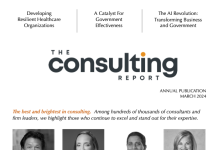Big Four firm Ernst & Young (EY) is considering separating its global auditing practice from its overall consulting business to free itself from the restrictions of tighter ethics regulations, according to a recent report by Bloomberg.
The recent tightening of ethics regulations by regions like the U.S., EU, and India have both barred firms from performing specific outside work for audit clients as well as constrained revenues that their consulting practices can generate. EY’s audit business reviews the books of some of the world’s largest companies, and is currently facing an array of fines and lawsuits arising from its work for the now-defunct payment processor Wirecard AG and for NMC Health Plc, on top of a $10 million Securities and Exchange Commission (SEC) fine in 2021 for audit independence violations.
The firm is reportedly discussing whether to spin off its global auditing practice, which accounted for $13.6 billion of the firm’s $40 billion global revenue in 2021. EY’s consulting practice earned $15.9 billion, with the remainder coming from its tax practice. Separating the audit and consulting practices would enable both to freely compete for clients without having to first obtain conflict-of-interest clearances.
“Stakeholders are telling EY that there needs to be a global solution to audit independence,” a source familiar with the firm’s deliberations said. “So it’s for a global firm to do, not national regulators.” Any formal separation could take over a year to complete, he said.
Other commentators are suggesting that a soft split would not substantially change things, recommending legislation that would further limit the consulting work that could be performed by auditors. The SEC has been turning up the pressure on firms, suggesting their highly profitable consulting fees could jeopardize auditor independence, a key safeguard introduced after the disastrous collapse of Enron and the later prosecution of accounting firm Arthur Andersen.
Ultimately, for EY to successfully spin off its auditing arm, the remaining three of the Big Four firms must do likewise, driving the adjustment of pricing to reflect growing risk and the end of consulting fees subsidizing audit services. While competitors PwC, KPMG, and Deloitte have no public plans to do so, the increasing pressure from government regulators may force their hands.

























